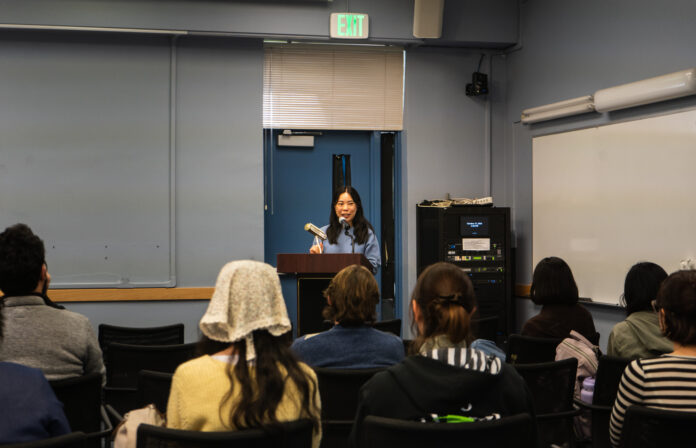The Davis native discussed the writing process, the meaning behind the novel and her experience as an Asian American writer
By SAVANNAH ANNO — arts@theaggie.org
Published in August 2023, Alexandra Chang’s second book, “Tomb Sweeping,” is an amalgamation of voices: including tales of grocery store workers, 11-year-old girls, college graduates and even gamblers. Praised by publications like The San Francisco Chronicle, the short story collection has solidified Chang as a compelling, character-driven writer.
On Oct. 17, the UC Davis Department of English hosted Chang at the first installment of their annual Creative Writing Series, in which different authors are invited to read from their newest books and answer questions from audience members.
Chang began the talk by reading an excerpt from “Flies,” a short story that details an 11-year-old girl’s experience growing up in an immigrant family with fighting parents. Before reading, Chang confirmed that despite not being explicitly stated, “Flies” actually takes place in Davis. Having grown up in the city herself, the story allowed Chang to reflect on some of her own experiences in adolescence.
“I have a couple of stories that are told from the perspective of children, which I think has been a perspective I’ve been drawn to because there’s an ironic distance that’s oftentimes built in,” Chang said. “The reader typically knows a little bit more than the character does, because the character is a child.”
Moderated by Assistant Professor of English Cindy Juyoung Ok, Chang went on to answer questions on various aspects of “Tomb Sweeping,” including the meaning behind its title, what the writing process was like and the book’s overall themes.
“I took the title of ‘Tomb Sweeping’ from one of the stories,” Chang said. “It comes from the Qingming Festival, which is a traditional Chinese celebration where people go and pay respects to their ancestors. That story and that sentiment felt like it resonated with the novel’s general themes of loss and how to continue living with it.”
Following the success of “Tomb Sweeping,” the short story collection has gone on to be taught in various Asian American Studies courses for its honest portrayal of generational divides, immigrant families and feelings of loss. Chang explained that while the themes can be received as universal by readers, the stories themselves don’t start out that way.
“When I’m writing, I’m not thinking theoretically,” Chang said. “I’m not thinking, ‘I want to address the collective Asian American experience.’ Instead, I tend to go at it through very specific characters, who maybe have doubts brewing in their minds [in relation to their identity] and are affected by them on a day-to-day basis.”
Consisting of 15 different stories, “Tomb Sweeping,” showed the full extent of Chang’s range. Moving between different perspectives, various settings and even ages of characters, Chang also discussed what the process was like to arrange such a wide variety of tales.
“It was the first time I had to arrange a collection, so I was thinking a lot about tone and how one story moves into the other,” Chang said. “I actually don’t read story collections front to back, but I was arranging it in a way for readers who would. I didn’t want five first-person stories in a row or five third-person stories in a row, and had to think about them all in relation to each other.”
Originally writing them as standalone stories, Chang fleshed out “Tomb Sweeping,” over a multi-year period. Before reaching its final form, the collection had to go through multiple rounds of editing.
“I cut four or five stories,” Chang said. “I think cuts are good, and some stories just weren’t as solid. I actually pushed the final draft submission back a year, and so at that point I had to meet the deadline, release it and realize writing is a process.”
Chang also explained how she goes about structuring — or sometimes purposefully not structuring — stories before she begins writing them out.
“I don’t outline,” Chang said. “I very much lean into writing as a discovery process, I like not knowing and seeing where a sentence is going to take me. Do whatever works for you in the moment that you’re writing, and whatever gives you energy.”
Letting her sentences take the lead in uncovering her stories has led Chang to pieces of writing like “Li Fan,” which relays the events of the tale to the reader in reverse. Beginning with the end, the story opens with the death of a woman the neighborhood knows as “the Asian recycling lady.”
Sometimes heartbreaking and always thought-provoking, Chang’s “Tomb Sweeping” speaks to the complexity of relationships in the various contexts of culture, place and generation.
A little over a year since its publication, and three years since the debut of her first novel, “Days of Distraction,” Chang lastly reflected on making peace with finishing both and looking forward to working on her next book.
“These books, they don’t have to be perfect representations of who I am as a writer,” Chang said. “They’re just one example of who I was at that time in my life, and hopefully I’ll have other books in the future that show the evolution of who I am.”
Written by: Savannah Anno — arts@theaggie.org






